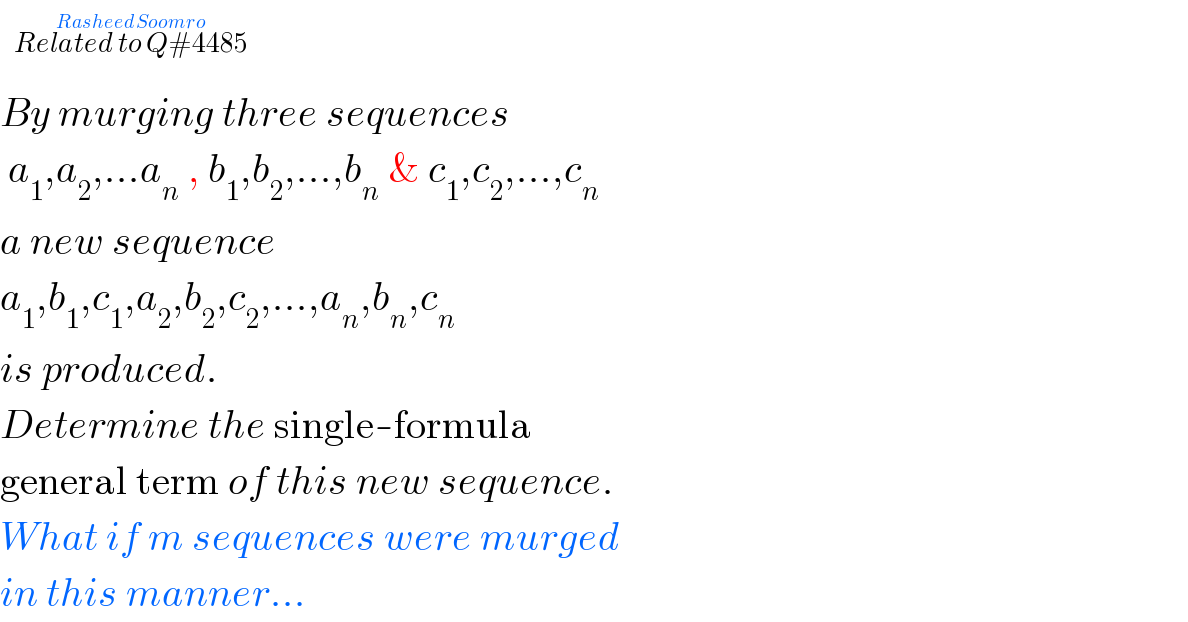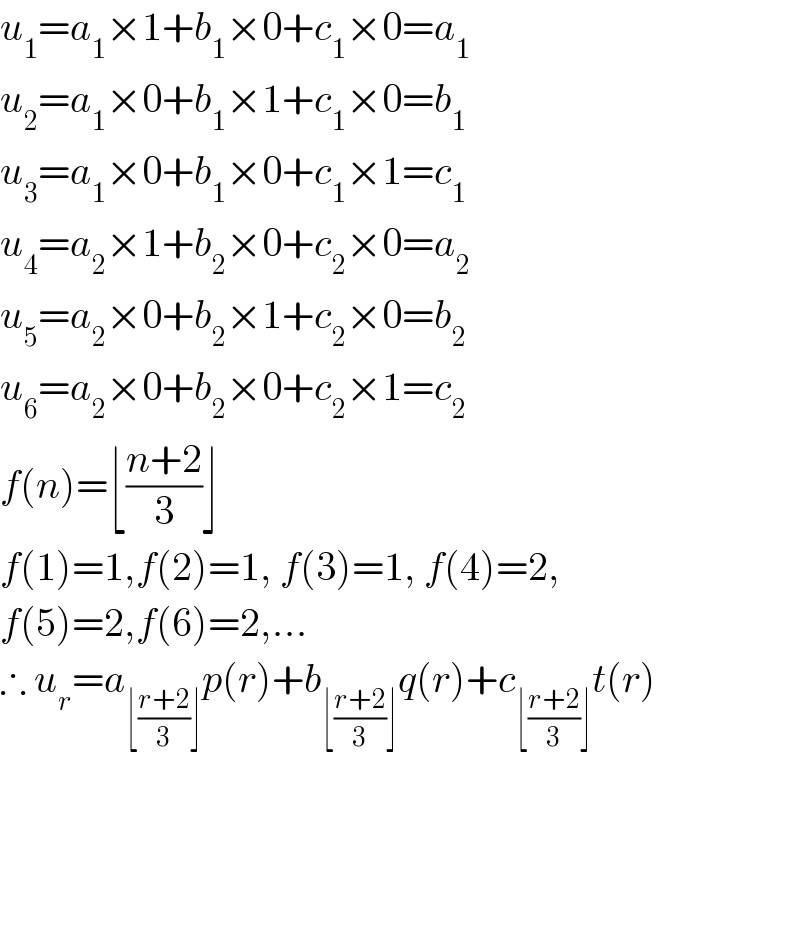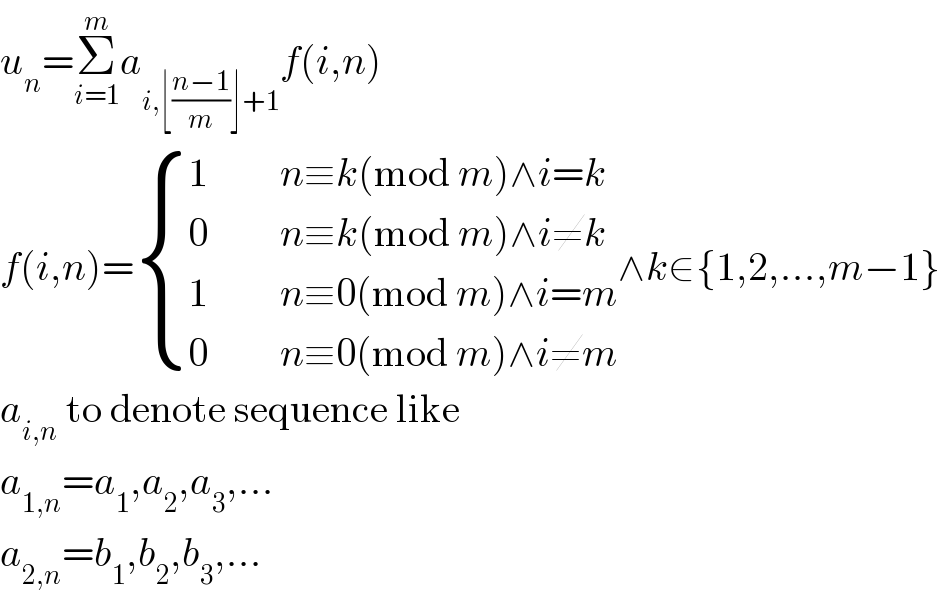
Question Number 4492 by RasheedSindhi last updated on 01/Feb/16

$$ \\ $$ $${By}\:{murging}\:{three}\:{sequences} \\ $$ $$\:{a}_{\mathrm{1}} ,{a}_{\mathrm{2}} ,...{a}_{{n}} \:,\:{b}_{\mathrm{1}} ,{b}_{\mathrm{2}} ,...,{b}_{{n}} \:\&\:{c}_{\mathrm{1}} ,{c}_{\mathrm{2}} ,...,{c}_{{n}} \\ $$ $${a}\:{new}\:{sequence}\: \\ $$ $${a}_{\mathrm{1}} ,{b}_{\mathrm{1}} ,{c}_{\mathrm{1}} ,{a}_{\mathrm{2}} ,{b}_{\mathrm{2}} ,{c}_{\mathrm{2}} ,...,{a}_{{n}} ,{b}_{{n}} ,{c}_{{n}} \\ $$ $${is}\:{produced}. \\ $$ $${Determine}\:{the}\:\mathrm{single}-\mathrm{formula} \\ $$ $$\mathrm{general}\:\mathrm{term}\:{of}\:{this}\:{new}\:{sequence}. \\ $$ $${What}\:{if}\:{m}\:{sequences}\:{were}\:{murged} \\ $$ $${in}\:{this}\:{manner}... \\ $$
Commented byYozzii last updated on 01/Feb/16

$${u}_{\mathrm{1}} ={a}_{\mathrm{1}} ×\mathrm{1}+{b}_{\mathrm{1}} ×\mathrm{0}+{c}_{\mathrm{1}} ×\mathrm{0}={a}_{\mathrm{1}} \\ $$ $${u}_{\mathrm{2}} ={a}_{\mathrm{1}} ×\mathrm{0}+{b}_{\mathrm{1}} ×\mathrm{1}+{c}_{\mathrm{1}} ×\mathrm{0}={b}_{\mathrm{1}} \\ $$ $${u}_{\mathrm{3}} ={a}_{\mathrm{1}} ×\mathrm{0}+{b}_{\mathrm{1}} ×\mathrm{0}+{c}_{\mathrm{1}} ×\mathrm{1}={c}_{\mathrm{1}} \\ $$ $${u}_{\mathrm{4}} ={a}_{\mathrm{2}} ×\mathrm{1}+{b}_{\mathrm{2}} ×\mathrm{0}+{c}_{\mathrm{2}} ×\mathrm{0}={a}_{\mathrm{2}} \\ $$ $${u}_{\mathrm{5}} ={a}_{\mathrm{2}} ×\mathrm{0}+{b}_{\mathrm{2}} ×\mathrm{1}+{c}_{\mathrm{2}} ×\mathrm{0}={b}_{\mathrm{2}} \\ $$ $${u}_{\mathrm{6}} ={a}_{\mathrm{2}} ×\mathrm{0}+{b}_{\mathrm{2}} ×\mathrm{0}+{c}_{\mathrm{2}} ×\mathrm{1}={c}_{\mathrm{2}} \\ $$ $${f}\left({n}\right)=\lfloor\frac{{n}+\mathrm{2}}{\mathrm{3}}\rfloor \\ $$ $${f}\left(\mathrm{1}\right)=\mathrm{1},{f}\left(\mathrm{2}\right)=\mathrm{1},\:{f}\left(\mathrm{3}\right)=\mathrm{1},\:{f}\left(\mathrm{4}\right)=\mathrm{2}, \\ $$ $${f}\left(\mathrm{5}\right)=\mathrm{2},{f}\left(\mathrm{6}\right)=\mathrm{2},... \\ $$ $$\therefore\:{u}_{{r}} ={a}_{\lfloor\frac{{r}+\mathrm{2}}{\mathrm{3}}\rfloor} {p}\left({r}\right)+{b}_{\lfloor\frac{{r}+\mathrm{2}}{\mathrm{3}}\rfloor} {q}\left({r}\right)+{c}_{\lfloor\frac{{r}+\mathrm{2}}{\mathrm{3}}\rfloor} {t}\left({r}\right) \\ $$ $$ \\ $$ $$ \\ $$ $$ \\ $$
Answered by 123456 last updated on 03/Feb/16

$${u}_{{n}} =\underset{{i}=\mathrm{1}} {\overset{{m}} {\sum}}{a}_{{i},\lfloor\frac{{n}−\mathrm{1}}{{m}}\rfloor+\mathrm{1}} {f}\left({i},{n}\right) \\ $$ $${f}\left({i},{n}\right)=\begin{cases}{\mathrm{1}\:\:\:\:\:\:\:\:\:{n}\equiv{k}\left(\mathrm{mod}\:{m}\right)\wedge{i}={k}}\\{\mathrm{0}\:\:\:\:\:\:\:\:\:{n}\equiv{k}\left(\mathrm{mod}\:{m}\right)\wedge{i}\neq{k}}\\{\mathrm{1}\:\:\:\:\:\:\:\:\:{n}\equiv\mathrm{0}\left(\mathrm{mod}\:{m}\right)\wedge{i}={m}}\\{\mathrm{0}\:\:\:\:\:\:\:\:\:{n}\equiv\mathrm{0}\left(\mathrm{mod}\:{m}\right)\wedge{i}\neq{m}}\end{cases}\wedge{k}\in\left\{\mathrm{1},\mathrm{2},...,{m}−\mathrm{1}\right\} \\ $$ $${a}_{{i},{n}} \:\mathrm{to}\:\mathrm{denote}\:\mathrm{sequence}\:\mathrm{like} \\ $$ $${a}_{\mathrm{1},{n}} ={a}_{\mathrm{1}} ,{a}_{\mathrm{2}} ,{a}_{\mathrm{3}} ,... \\ $$ $${a}_{\mathrm{2},{n}} ={b}_{\mathrm{1}} ,{b}_{\mathrm{2}} ,{b}_{\mathrm{3}} ,... \\ $$
